All Aboard the Train to Hadestown
Many know the story of Orpheus, the doomed poet who tries to save his wife from the throes of the underworld. A mere mortal, he attempts to take on gods and eventually fails to his humanity. The ending is grim, as those of Greek myths often are, and this is well known as each audience member takes their seat at New York Theatre Workshop’s Hadestown.
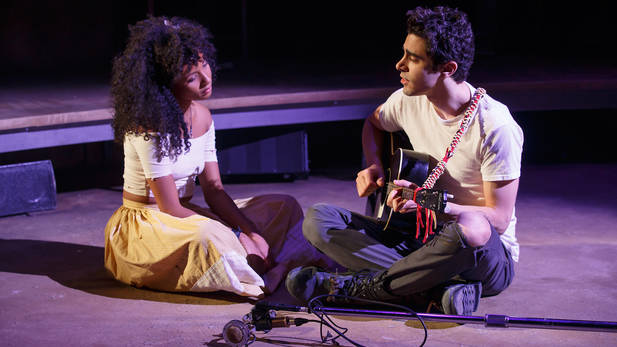
The show is based on the 2010 concept album by Anaïs Mitchell, who collaborated with folk artists Justin Vernon of Bon Iver, and Greg Brown to create an alternative portrayal of the classic tale. Her lyrics and music create a unique method of storytelling that is incredibly engaging.
The show starts with Hermes, played by a magnetic Chris Sullivan, taking the floor as a resigned narrator. Center stage, scruffy, and dressed in black, Hermes speaks in gruff dialogue about the tale we all know—“The story of someone who tried.” Even as the young lovers take the stage, Hermes reminds us how the story ends while a reluctant Eurydice (Nabiyah Be) responds to Orpheus’ (Damon Daunno) attempts at courtship in “Wedding Song.” Eurydice is eventually swept off her feet with beautiful words and promises of love and happiness. She is so caught up in the life Orpheus paints for her that they are soon wed in the height of summertime, with Persephone (the wife of Hades) in attendance.
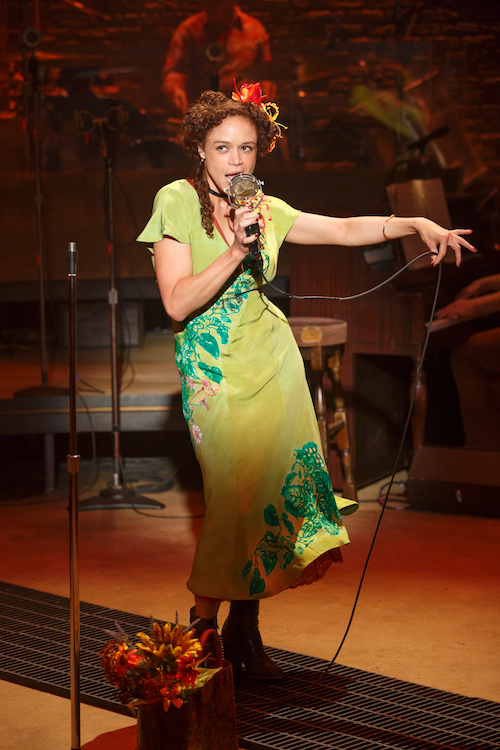
Persephone steals the show with her revelry. She is the life of the party during the summer time, the only months she spends outside the dark den of her husband’s kingdom. Drinking and dancing, Persephone thrives in the sun before she has to board the train to Hadestown come autumn. Amber Gray plays the part with such charisma and talent that the audience can’t help but fall under her spell as she dances around the space singing “Living it Up.” Her fluid movements and powerhouse voice add depth to the Queen of the Underworld as she goes from sunshine to the smoky den of Hades. She skirts around her husband, audaciously confronting him about his faults in “How Long.” What had once been a young love has been lost in the hot foundries of the underworld, and both are left bereft.
Gray’s vocal performance is matched by those of Orpheus and Eurydice. Nabiyah Be’s voice is unique and incredibly powerful as she cries out for something more. Her relationship with Orpheus is challenged by the scarcity that winter brings, and soon Eurydice realizes that her husband’s pretty words don’t put food on the table. Her plea is heard by Hades himself. “Hey little songbird,” he sings, “let me guess. He’s some kind of poet and he’s penniless.” He offers Eurydice a full belly and a warm bed in the underworld, and she accepts the train ticket to Hadestown.
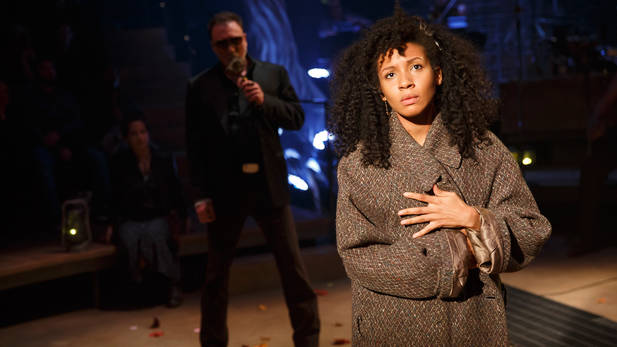
And so it is that we accompany Eurydice down to her new home. The Fates, played wonderfully by Lulu Fall, Jessie Shelton, and Shaina Taub, follow and mock her for thinking that she is any more special than the countless others who have been lured to work in Hades’ factories. They ask, “What you gonna do when the chips are down? Now that the chips are down.”
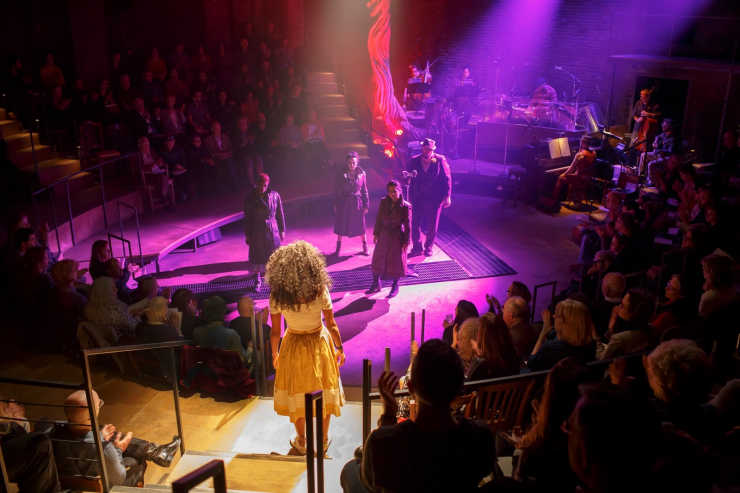
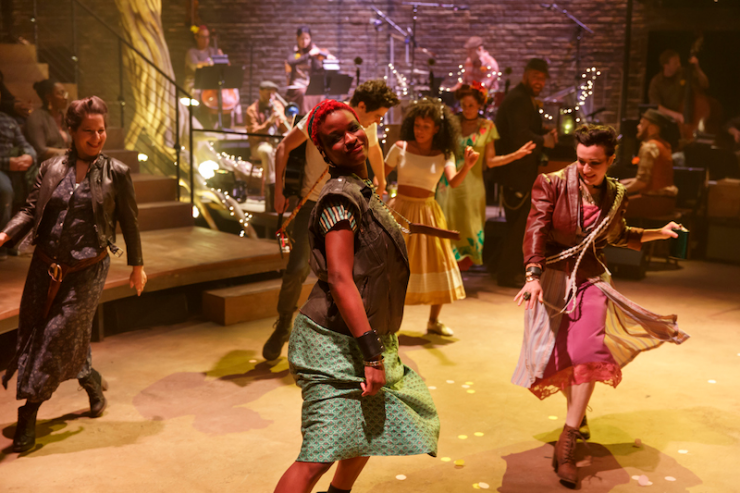
It was very interesting to see the underworld painted as a thriving industrial hub. Hades in the role of foundry foreman seemed fitting. Both his question “Why do we build the wall?” and his followers’ response: “We build the wall to keep us free,” seem very apropos to current political rhetoric.
It comes as no surprise that Eurydice is unhappy with the arrangement, regretting her decision to sign away her life for a warm bed. Orpheus eventually realizes where his wife has gone and begins the long trek down into the underworld.
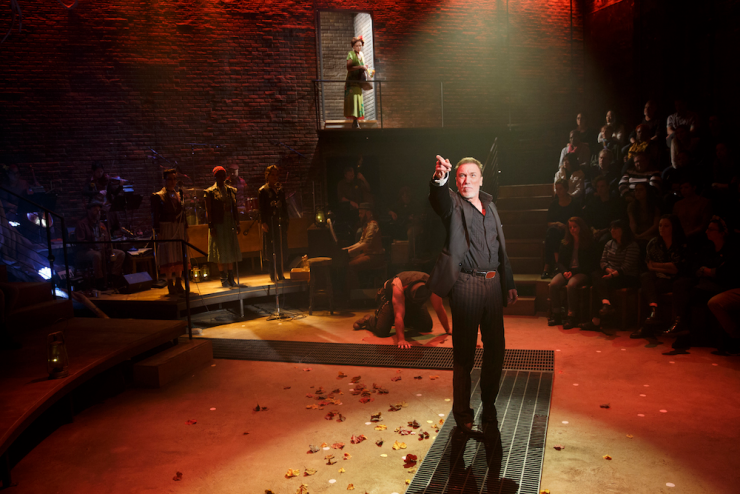
One of the most moving parts of the entire show is when Orpheus is called upon to sing for Hades. He is tasked with convincing the god to let Eurydice go. Hades, along with the audience, doubts a mere song can sway him. Yet when Daunno began to sing in falsetto, I was just as moved as Hades. Orpheus’ voice is perfectly matched with the nature of the song, and Daunno adds colorful emotions that swept the audience off their feet. He reminds Hades what it’s like to be in love, and how it felt to fall in love with Persephone. The King of the Underworld is so moved that he takes his wife in his arms for a dance.
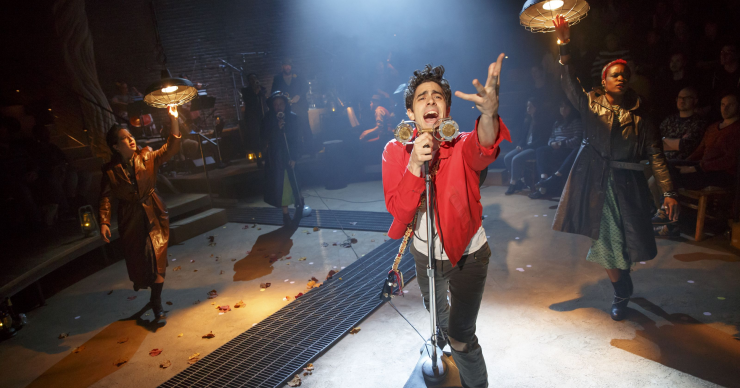
The staging of Hadestown is just as enthralling as the players. New York Theatre Workshop arranged seats in a circular, in-the-round style that allows the actors to move effortlessly through the crowd. This works well in numerous scenes—Persephone passes drinks to audience members, Hades sings to his wife as he winds through the rows of chairs, and even Eurydice’s fateful walk takes her and Orpheus through the crowd.
The tale of Orpheus is one that has been told many times, whether it be on the stage or in a classroom, but this production and staging have given the tale new life. Director Rachel Chavkin’s use of the space adds intimacy to a well-known story, drawing you in until you are caught up in each character’s journey. The choreography by David Neumann makes every movement beautiful and more poignant, complementing Chavkin’s poetic direction.
The beauty of this show is that it fully fleshes out each character, making them so engaging that the crowd is wooed into forgetting how the story ends.
The beauty of this show is that it fully fleshes out each character, making them so engaging that the crowd is wooed into forgetting how the story ends. I was reminded of Hermes’ words at the top, which described Orpheus’ unique talent, and I couldn’t help but agree. “He could make you see how the world could be, in spite of the way it was.” We all knew the possible endings: one where Orpheus succeeds and wins back his wife, or one where Orpheus looks back, losing everything to doubt.
I was so caught up in this realm of possibility that I was shocked when Orpheus finally makes his mistake. The harmonies stop and Eurydice looks at him in horror, knowing that she has been doomed to the underworld by her beloved. He seems surprised as well, and he is only able to explain himself with a disappointing, “I missed you.”
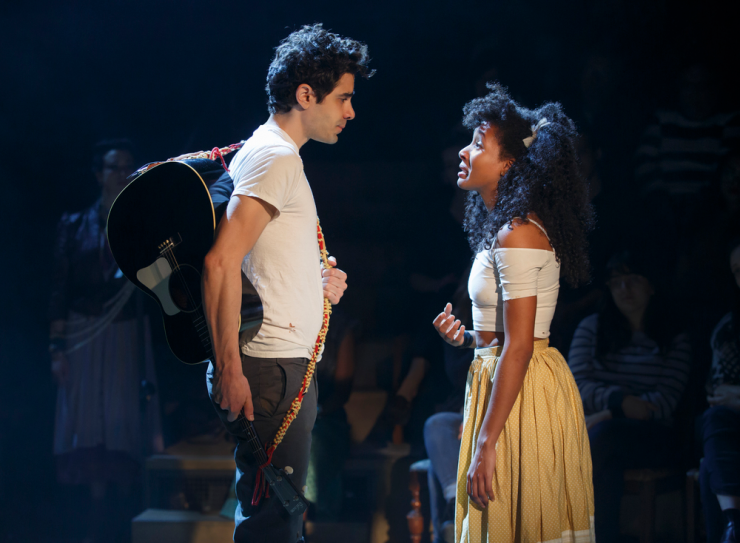
This moment is incredibly well staged as Hermes walks out, shaking his head at the ending we all knew was coming. He beckons Eurydice down, seeming just as sad and disappointed as she is, and the result is heartbreaking.
Hadestown seamlessly blends folk songs, myth, and romance with outstanding talent and vision to become an overall breathtaking experience. The music by Anaïs Mitchell creates a beautiful backdrop to this moving story about someone who tried to defy all odds, and whose only mistake was that of being human. “To Orpheus and all of us. Goodnight, brothers, goodnight.”

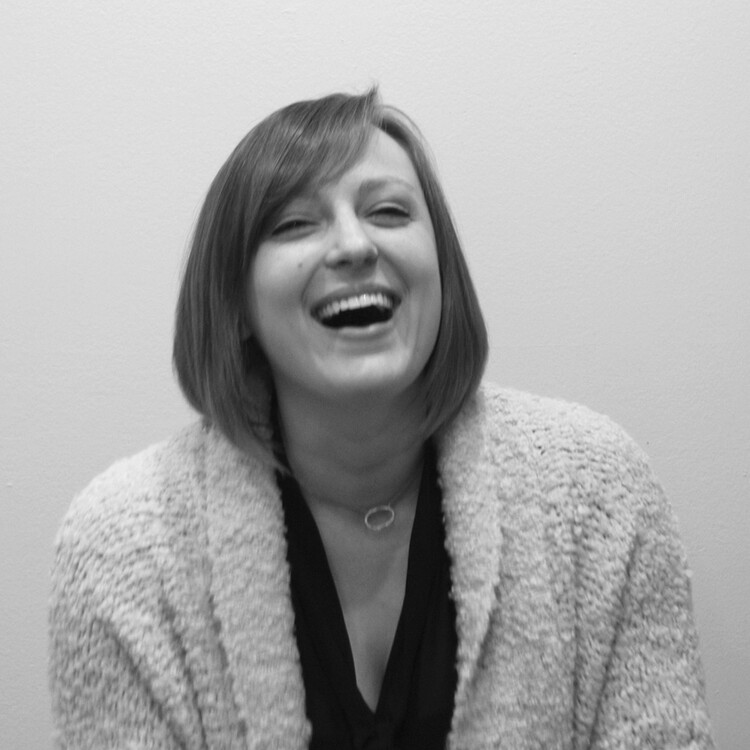
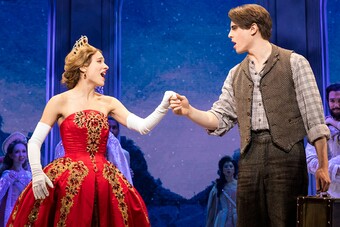

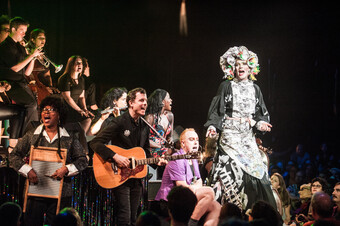

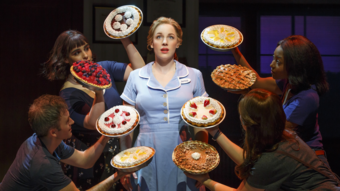

Comments
The article is just the start of the conversation—we want to know what you think about this subject, too! HowlRound is a space for knowledge-sharing, and we welcome spirited, thoughtful, and on-topic dialogue. Find our full comments policy here